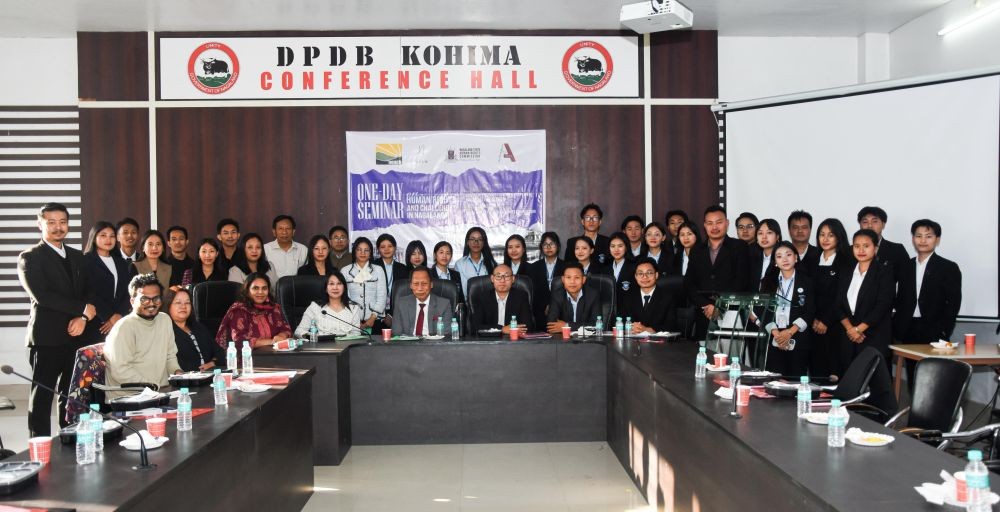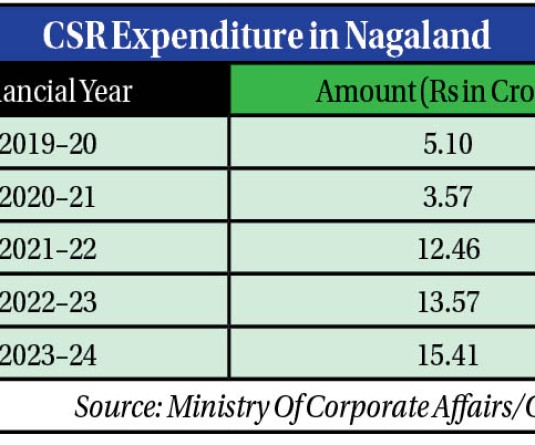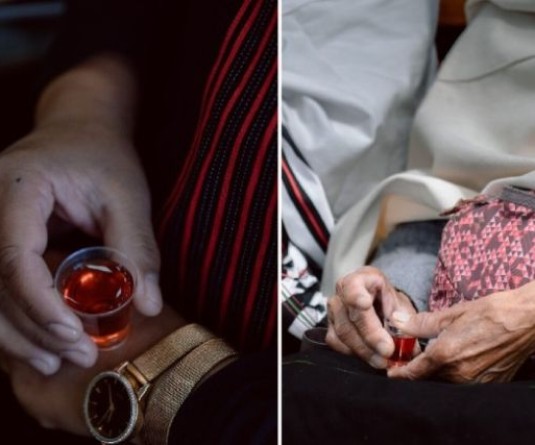Dignitaries and others during seminar on “Human Rights and challenges in Nagaland” on October 25 in Kohima.

Kohima, October 26 (MExN): The Northeast Support Centre and Helpline–Northeast Law Network (NESCH-NELN), in collaboration with the Nagaland State Human Rights Commission (NSHRC), organized a one-day seminar on “Human Rights and Challenges in Nagaland” on October 25 at the DPDB Conference Hall, Kohima.
The seminar brought together leaders of various civil society organizations (CSOs), student unions, law students, participants from St. Joseph’s University, Jakhama, and members of the Avazeein Foundation team from Delhi.
Delivering the inaugural address, Justice Songkhupchung Serto, Chairman of the NSHRC, noted that while human rights is one of the most discussed topics, it remains one of the least understood and acted upon. He traced the origins of the Universal Declaration of Human Rights, highlighting the contribution of Indian delegate Hansa Mehta, who replaced the phrase “All men are born free and equal” with “All human beings are born free and equal” in Article 1.
Justice Serto underlined that mutual respect for human rights forms the foundation of peace, and peace in turn ensures development and progress. He informed that in the past two years, the NSHRC has examined conditions in hospitals, public schools, and the public distribution system, in addition to cases of rights violations, and has made recommendations for improvement.
Among key initiatives, he cited the Commission’s recommendation to revise Nagaland’s minimum wages, noting that while all other northeastern states have updated their wage rates in the last three years, Nagaland has not done so for five years. The NSHRC also investigated a custodial death in Chümoukedima, recommending Rs 5 lakh in compensation, which the government subsequently paid, and proposed the upgrading of jail infrastructure. Additionally, the Commission has urged the framing of rules under the Organ Transplantation Act to enable life-saving medical procedures in the state.
Dr. Alana Golmei, Advocate and General Secretary of NESCH, spoke on the rights violations faced by northeastern communities in metropolitan cities. She outlined the widespread issues of racial discrimination, workplace exploitation, sexual harassment, and human trafficking, stating that many are deceived with false promises of employment or education. NESCH, she said, continues to intervene and advocate against such systemic discrimination.
Advocate K. Arkha Achumi, representing NESCH-NELN Nagaland, discussed Land Acquisition in Nagaland: Laws and Remedies. He emphasized that the current Nagaland Land (Requisition and Acquisition) Act, 1965, is outdated and based on the colonial Land Acquisition Act of 1894. He recommended adopting the Right to Fair Compensation and Transparency in Land Acquisition, Rehabilitation and Resettlement Act, 2013, which would ensure fair compensation, rehabilitation, and resettlement for affected citizens.
S. Pangai Konyak, representing the victims’ families of the Oting incident, recounted the tragedy as a case of extra-judicial killing and called for “truth, justice, and recognition of human dignity,” stressing that peace cannot exist without justice.
Speaking on the role of communities in preserving indigenous land rights, Ato Yim said that land for the Nagas is “not merely a resource but the foundation of identity and heritage.” While constitutional safeguards like Article 371(A) and the Inner Line Permit (ILP) offer protection, he cautioned that internal complacency and illegal transfers threaten indigenous control over land. He urged local bodies, village councils, and citizens to take responsibility in monitoring land use and ownership.
The seminar was chaired by Advocate Abel Ayemi of NESCH-NELN, while the vote of thanks was delivered by Advocate Benison Shohe.






